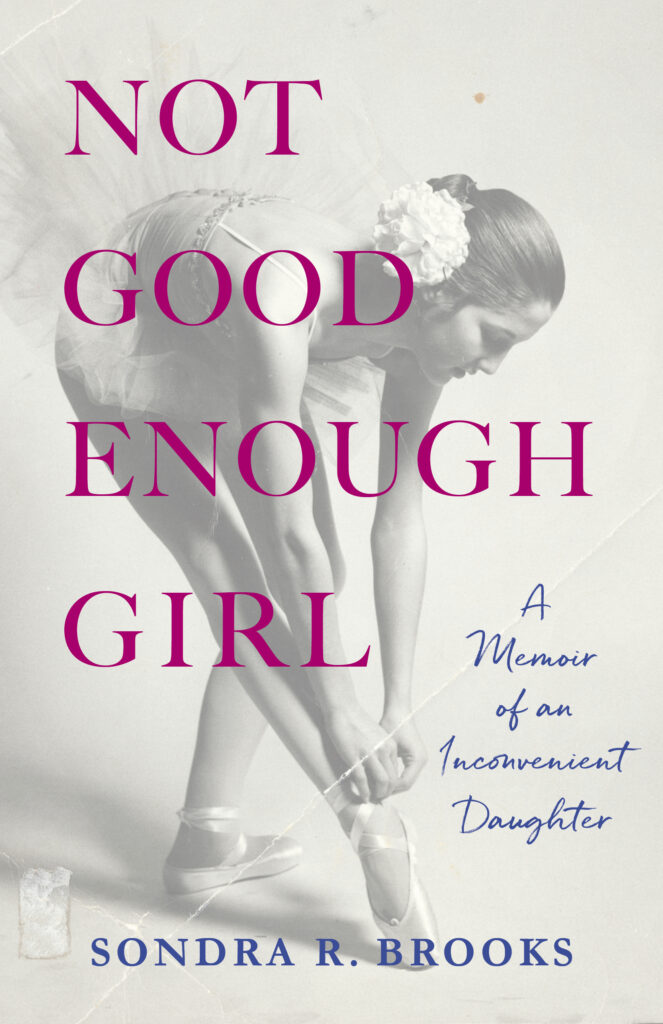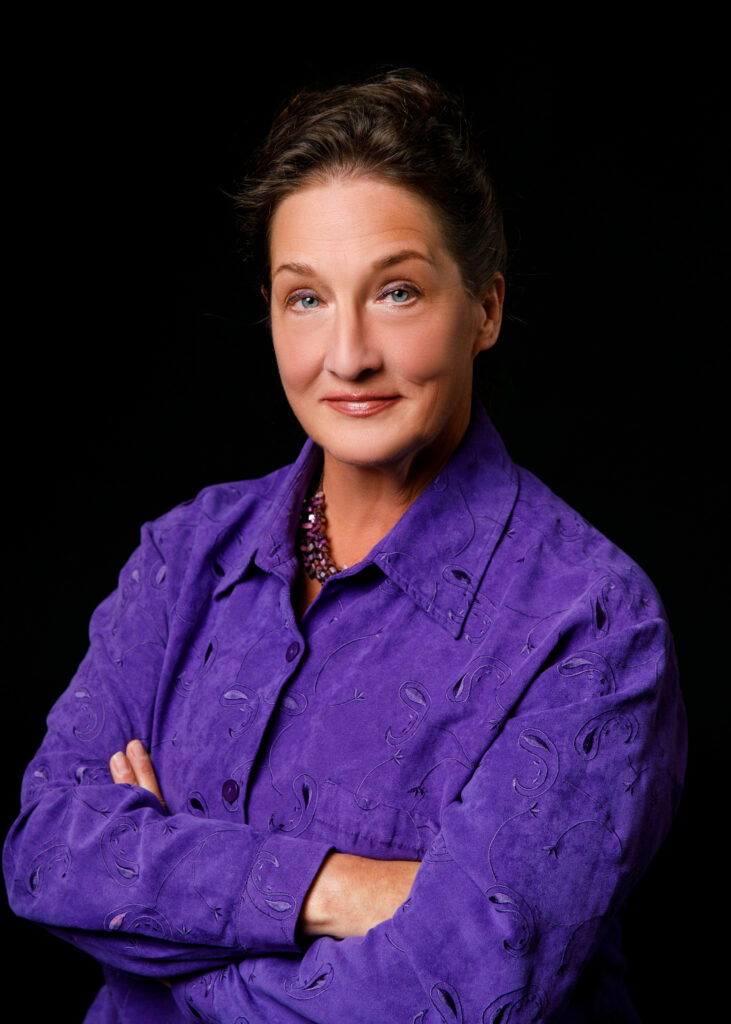 In Not Good Enough Girl, amidst the control, confusion, and chaos caused by her eight-times-married mother, Sondra Brooks’ story spans the extreme emotions of a mother-daughter relationship, touching on cyclical family dysfunction, addiction, and forgiveness.
In Not Good Enough Girl, amidst the control, confusion, and chaos caused by her eight-times-married mother, Sondra Brooks’ story spans the extreme emotions of a mother-daughter relationship, touching on cyclical family dysfunction, addiction, and forgiveness.
Beginning at the age of five, Sondra spends decades auditioning for the role of her authentic self. Her dazzling mother casts her as confidante and co-conspirator in her affairs and serial marriages. Sondra vacillates between fierce anger toward her mother—who does nothing to protect her from physical, sexual, and emotional abuse—and a desperate need for her love and approval.
As an adult, Sondra enters into and stays in a toxic marriage for years, engaging in affairs with married men rather than divorcing. When therapy and AA eventually propel her out of the sense-deadening haze of alcohol and cigarettes, she summons the courage to tell her husband she plans to leave him. He reacts by playing on her biggest fear, telling her, “You’re going to turn out just like your mother.”
Sondra attempts to establish a sober and separate identity, but tensions between her and her mother further increase when she marries someone new—a man who displaces her mother as the epicenter of her life—and her mother’s seventh marriage ends. During this time, traumatic childhood memories suddenly surface and a seismic shift occurs, freeing Sondra from her need for maternal connection. But establishing a life independent from her mother proves far more complicated than she could have imagined.
 Sondra R. Brooks graduated from Interlochen Arts Academy as a ballet major, studied musical theatre at Carnegie Mellon University, and earned a Bachelor of Business Administration from University of Phoenix. She is a three-time award winner in the International Writers’ Digest Competition for her memoir/essays “Vincent,” “The Magic Tumor Theory,” and “Jimmy.” Brooks has served as judge in various writing competitions and is a member of Authors Guild of America, Story Circle Network, National Association of Memoir Writers, and North Carolina Writers Network. She lives in a log cabin in the woods with three cats and seven rescue dogs. Her husband of seventeen years considers himself to be a rescue as well. She enjoys cycling, beekeeping, forest farming, organic gardening, and caring for her botanical sanctuary. She presently makes her home in Pittsboro, North Carolina.
Sondra R. Brooks graduated from Interlochen Arts Academy as a ballet major, studied musical theatre at Carnegie Mellon University, and earned a Bachelor of Business Administration from University of Phoenix. She is a three-time award winner in the International Writers’ Digest Competition for her memoir/essays “Vincent,” “The Magic Tumor Theory,” and “Jimmy.” Brooks has served as judge in various writing competitions and is a member of Authors Guild of America, Story Circle Network, National Association of Memoir Writers, and North Carolina Writers Network. She lives in a log cabin in the woods with three cats and seven rescue dogs. Her husband of seventeen years considers himself to be a rescue as well. She enjoys cycling, beekeeping, forest farming, organic gardening, and caring for her botanical sanctuary. She presently makes her home in Pittsboro, North Carolina.
Her memoir, Not Good Enough Girl: A Memoir of an Inconvenient Daughter, will be released on March 4 from She Writes Press, and in celebration, I am excited to share this Q&A.
What motivated and inspired you to share your story?
Sondra Brooks: Over the years, when I related certain life events to others, they so often said, “You really should write a book!” When my mother’s sixth husband died, the wave of guilt, anger, and disturbing memories that arose propelled me back into therapy, and I began to write about my past in detail.
As I wrote, the ME TOO movement developed. Then, more and more women, especially, shared their reasons for going no-contact with an abusive parent. I had grappled with the no-contact decision, and although I decided against it for myself personally, I fully understood the gravity of such a choice. Women’s voices grew increasingly strong in current events as I wrote. I saw my own story in theirs, and vice versa. My brother and I were trained as children through physical abuse and emotional manipulation to remain silent and subdued. I was in awe of the growing sense of female empowerment I saw as I wrote the book, and I gained enough courage to voice my own pain and anger.
It takes courage to share such difficult and personal experiences the way you do in Not Good Enough Girl. What was the process of writing this book like for you, and how has it impacted you?
 SB: I had no idea of the emotional energy it would require. I believed it was imperative to discern how I felt about what happened when it happened, not only looking back as an adult. I had to dismantle the defense mechanism I’d developed of using humor to cover emotional pain. Many of the events in the book are so dysfunctional as to be laughable, but the reader gets to make that decision.
SB: I had no idea of the emotional energy it would require. I believed it was imperative to discern how I felt about what happened when it happened, not only looking back as an adult. I had to dismantle the defense mechanism I’d developed of using humor to cover emotional pain. Many of the events in the book are so dysfunctional as to be laughable, but the reader gets to make that decision.
I remember a Writing Wild exercise which left me angry for three days straight, and it turned out to be a breakthrough. I’d lived so much of my dysfunctional childhood in bewilderment and endured my dead marriage in a haze of alcohol. But pain remained underneath throughout, and my only choice while writing the memoir was to go straight to the core of that pain each and every time. It was rare when time spent writing didn’t feel as if I’d undergone an intense therapy session. I am no longer afraid of those feelings.
What has been the most difficult challenge you have overcome during your writing and publication journey?
SB: I was trained in childhood to be silent, “ladylike,” and not make waves. Now, here I sit at my desk with a final copy of the memoir—259 pages of everything I felt finally had to be said. Anne Lamott said, “If people wanted you to write warmly about them, they should have behaved better.” While the last thing I wanted was for the book to hurt anyone, the challenge was to turn off the programmed internal voice telling me to remain silent as I’d been taught. So, the most challenging part of writing the book became the most rewarding. This is my wild, weird, intensely personal story, and by god I told it!
Do you have any advice for those who want to share their own story but don’t know where to start?
 SB: I can’t stress enough the value of a consultation with a professional who knows the publishing industry. Before you spend years writing a book, find out first if the premise can withstand the “So what?” test. What was compelling subject matter years ago may earn barely a yawn these days.
SB: I can’t stress enough the value of a consultation with a professional who knows the publishing industry. Before you spend years writing a book, find out first if the premise can withstand the “So what?” test. What was compelling subject matter years ago may earn barely a yawn these days.
Read as many memoirs as you can! While major publishing avenues have closed their doors to most of us, other excellent options appeared in their place. So, test the waters and find the options that work best for you. Hire a developmental editor. Start a blog. Try your hand at Substack. Enter competitions and respond to calls for submissions. Don’t forget small, Indie, and/or hybrid publishers. Join a writing group. Take courses. Investigate self-publishing. Keep writing and submitting your work!
What do you hope readers take away from Not Good Enough Girl?
SB: DON’T BE AFRAID.
Pre-order your copy of Not Good Enough Girl: A Memoir of an Inconvenient Daughter today!

I love Sondra Brooks take-away: “Don’t be afraid.”